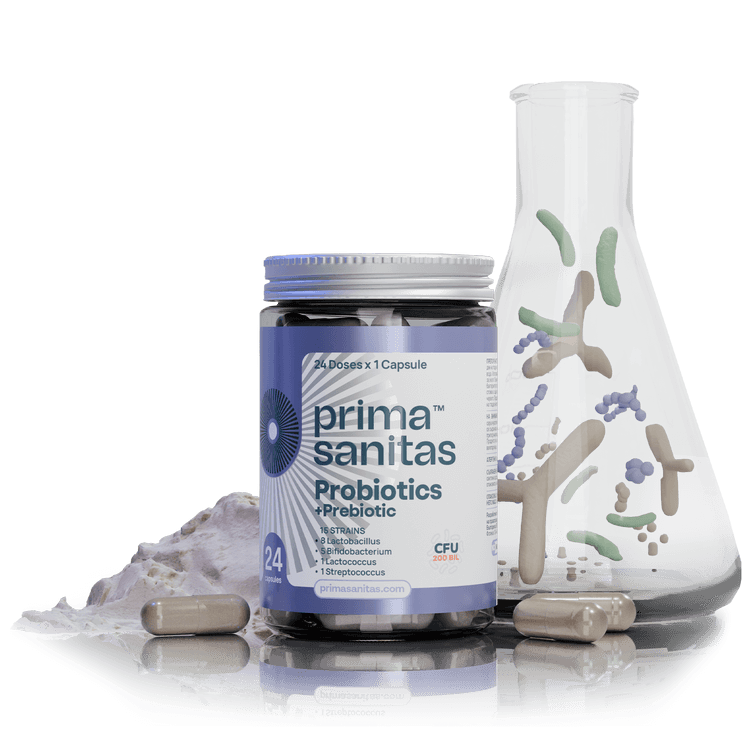Gut microbiome is a diverse consortium of bacteria, archaea, fungi, protozoa and viruses that inhabit the gut of all mammals. Human studies have established the role of the microbiome in a number of physiological processes that are vital to the host’s health, including homeostasis, metabolism, intestinal epithelial health, immunological activity, etc.
The gut and gut microbiome represent an extremely rich and dynamic ecosystem where important functions take place such as fermentation of fiber into short-chain fatty acids, protein and complex carbohydrate metabolism, vitamin synthesis, etc.
The microbiome consists of:
Dynamic interactions between normal gut microbiota and the host’s innate and acquired immunity play a key role in maintaining gut homeostasis and inhibiting inflammation. As a defense mechanism, intestinal epithelial cells produce a mucosal barrier whereby they separate the microbiota from the host’s immune cells and reduce intestinal permeability. The microbiota, on the other hand, forms a huge number of metabolic postbiotic products that form a protective barrier over the epithelial mucosa whereby they protect its integrity.
Polyphenols are compounds naturally found in plants (fruits, vegetables, nuts, spices, etc. ) and are the most common sources of antioxidants in food.(1) Since a large proportion of polyphenols remain unabsorbed along the gastrointestinal tract, they accumulate in the colon where the gut microbiota breaks them down into their bioactive metabolites, they are absorbed into the circulation and exert their helpful effects on the body.(2) Intake of polyphenols also stimulates the growth and development of helpful bacteria in the gut microbiome (such as Lactobacillus Bifidobacterium), which suppress the development of potentially pathological strains (such as Clostridium ). Thus, a diet rich in polyphenols maintains gastrointestinal homeostasis (3).
During chemotherapy and radiation therapy the mucosal lining of the gastrointestinal tract may be disrupted, its permeability may be increased and the balance between helpful and pathogenic bacteria in the gut microbiome may change (dysbacteriosis), leading to disruption in the synthesis of protective metabolic products, induction of mucositis and enteritis. All these are prerequisites for opportunistic infections and sepsis or acute conditions such as bleeding, pain, diarrhea and malabsorption.
In the majority of cancer patients poorly managed gastrointestinal toxicities create the need for dose reduction, regimen modification and prolonged time of administration of antitumor treatments, which results in lower effectiveness of the therapy administered.
Probiotic therapy may represent an appropriate preventive means to prevent acute and chronic damage associated with the application of chemotherapy and radiation therapy without affecting their effectiveness and without creating additional toxicities or drug cross-reactions.(4)
Chemotherapy-induced diarrhea (CID) is one of the most common toxicities during treatment of cancer patients. It may lead to weight loss, dehydration, malnutrition, fatigue and malaise, electrolyte imbalance and inability to have optimal drug treatment administered. Extremely severe dehydration may cause acute kidney disease and rarely death. A meta-analysis and double-blind randomized clinical studies demonstrate the effectiveness of Lactobacillus, Bifidobacterium and Streptococcus thermophilus strains in preventing and treating chemotherapy-induced diarrhea in a statistically significant manner with no evidence of increased incidence of iatrogenic infection.(5)(6) A double-blind placebo-controlled study demonstrated how probiotic therapy reduced oral mucositis induced by chemotherapy and radiation therapy in patients with head and neck cancers.(7).
Lactobacillus bulgaricus has a proven preventive function in the gastrointestinal tract. It reduces tumorigenesis by limiting inflammation and alleviating chronic colitis.(8) Lactobacillus rhamnosus reduces the incidence of severe diarrhea, abdominal discomfort and intestinal toxicity associated with 5-FU infusion.(9) Streptococcus thermophilus reduces the severity of Methotrexate-induced small intestinal mucositis in an animal model study.(10)
Probiotics have a good safety profile and no toxicities have been described in studies, yet we have to remember that these are live microorganisms presenting a potential risk of iatrogenic infection in severely immunocompromised patients – post-transplant patients, patients on immunosuppressive therapy, patients with hematological diseases undergoing high-dose myeloablative chemotherapy, febrile neutropenia patients.(11)
